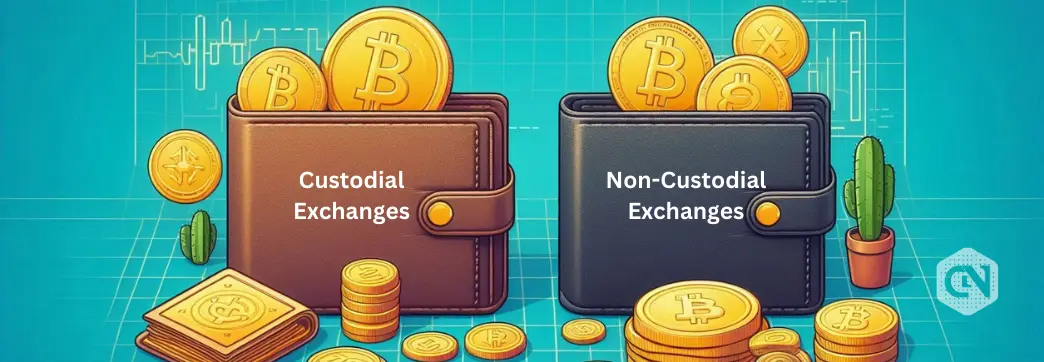Modern crypto wallets have made cryptocurrencies accessible to everyone. Crypto wallets function as any other wallet, but only for storing digital assets. Instead of holding physical items, crypto wallets store private keys that users employ to sign for their crypto transactions.
The popularity of crypto wallets has led to the emergence of two main exchange structures based on how they handle stored digital wallets: custodial and non-custodial wallets. There is a subtle difference between custodial and non-custodial exchanges and centralized and decentralized exchanges. For a better understanding, read our Centralized vs. Decentralized Crypto Exchanges.
In this article, we will share the key differences between custodial and non-custodial crypto exchanges in terms of functionality, security, and user control.
Understanding Crypto Wallets: A Pre-Exchange Primer
Crypto wallets are found on cryptocurrency platforms in the form of software programs that can be utilized with a stable internet connection to connect to blockchain networks. They hold an individual’s private keys, which are critical in handling and accessing one’s crypto assets.
There are two forms of crypto wallets – hot wallets and cold wallets – the two primary methods of exchanging and holding cryptocurrencies. Hot wallets are internet and online-based, whereas cold wallets are offline and come in the form of a physical device such as a USB stick.
Crypto wallets contain two primary parts – public keys and private keys. The keys consist of a series of numbers and letters that are intended for various purposes. Crypto wallets maintain the private keys of cryptocurrencies once mined or bought. The owner of the private keys holds control over the cryptocurrency in the wallet.
Understanding Custodial Exchanges
Custodial crypto exchanges are online websites where users can purchase, sell, or exchange cryptocurrencies such as Bitcoin and Ethereum. They also hold users’ money and store the private keys of their cryptocurrencies. Custodial crypto exchanges are much like banks where users invest money or cryptocurrency into their exchange wallet or bank account. The exchange will store the user’s private keys and permit them to exchange.
The benefits of custodial crypto exchanges are:
- Convenience – Custodial crypto exchanges provide easy and friendly interfaces with simple options for buying and selling crypto for beginners to start
- Security – They invest heavily in excellent security features to safeguard customer assets.
- Features – Custodial exchanges provide extra features like interest-bearing, staking, and trading accounts.
Drawbacks of custodial exchanges are:
- Lack of control – Clients cannot maintain their private keys, so they have limited control over the cryptocurrencies they buy.
- Counterparty risk – A custodial exchange can be hacked or become insolvent. In such situations, clients’ money may be in jeopardy.
- Limited functionality – All custodial exchanges do not support sophisticated functions like margin trading or staking.
What are Non-Custodial Exchanges?
Non-custodial crypto exchanges give users full control over their assets and create private keys during wallet creation. They are referred to as self-custodial exchanges that enable crypto trading without keeping client funds and private keys. Users are able to connect their own hot or cold wallets directly to their decentralized exchange platforms. Trades on non-custodial exchanges are done directly between the users without involving any intermediaries.
The benefits of non-custodial exchanges are:
- Security – Security is the most critical component of non-custodial exchanges, as customers can maintain full control over their private keys, thus minimizing the threat of hacking.
- Privacy – Self-custody exchanges provide higher privacy than custodial exchanges. Because users own their assets and private keys, they can maintain their transactions and holdings of crypto more private.
- Decentralization – Non-custodial exchanges are compatible with the major tenets of crypto–censorship resistance and control by the users.
Drawbacks of non-custodial exchanges:
- Complexity – Non-custodial exchanges demand a firm grip on cryptocurrency wallets. Further, the interfaces may be less intuitive and user-centric.
- Liquidity – Non-custodial crypto exchanges are also reported to have less liquidity than their custodial counterparts, with lower volumes of trades for particular tokens.
- Slow transactions – The speed of a transaction on non-custodial exchanges may be slower than on custodial exchanges.
How to Choose the Right Crypto Exchange For You
The online crypto market has several options for crypto exchanges to choose from. Choosing the best crypto platform that prioritizes user account security can be a challenging task. Here are a few factors to consider while choosing the right exchange –
- While crypto is a secure currency, users still need to ensure that crypto is used safely. It offers many security measures, such as two-factor authentication, cold storage, and encryption protocols that crypto exchanges employ to keep client funds safe.
- Choose a crypto exchange depending on your current experience level. Determine whether you are a complete beginner, an intermediate, or an advanced trader, and choose exchanges accordingly.
- Evaluate your investment goals and choose a platform based on whether you want to achieve short-term or long-term investments.
- Depending on the level of control and privacy users are looking for, many crypto exchanges require varied degrees of client information for registration and account creation.
Conclusion
Custodial and non-custodial exchanges have their benefits and limitations. For users who prioritize convenience, ease of use, and security, custodial exchanges are the most sensible solution. However, for those who want full ownership and control over their private keys, non-custodial exchanges are what they are looking for. Ultimately, the decision lies with the users.
See less
